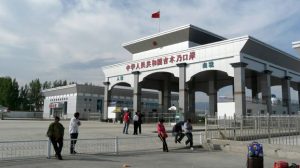PRESS RELEASE: WUC CALLS ON CHINESE AUTHORITIES TO HALT RESTRICTIONS ON ETHNIC KAZAKHS IN EAST TURKESTAN

Press Release – For immediate release
11 August 2017
Contact: World Uyghur Congress www.uyghurcongress.org
0049 (0) 89 5432 1999 or [email protected]
 The World Uyghur Congress calls on the Chinese government to halt its increasing restrictions on ethnic Kazakhs and other ethnic minorities native to the region and to uphold international standards in terms of fair treatment and protection for vulnerable groups. The Chinese government has begun to impose unjust restrictions on ethnic Kazakhs living in East Turkestan in particular that continue to resemble those on the Uyghur population there.
The World Uyghur Congress calls on the Chinese government to halt its increasing restrictions on ethnic Kazakhs and other ethnic minorities native to the region and to uphold international standards in terms of fair treatment and protection for vulnerable groups. The Chinese government has begun to impose unjust restrictions on ethnic Kazakhs living in East Turkestan in particular that continue to resemble those on the Uyghur population there.
Throughout 2017, the Chinese government has stepped up its campaign targeting members of the Kazakh minority in East Turkestan—who number around 1.5 million at current estimates. Heavy restrictions on freedom of movement, expression, privacy and religion have all been felt as authorities have set their gaze upon those with contacts outside the country.
Dozens of ethnic Kazakhs were detained in early August in East Turkestan for maintaining ties to friends and relatives beyond the border. More than thirty others were detained since the start of 2017 for conversations on their smartphones with friends and relatives about how best to emigrate to Kazakhstan. Serek Yelsik, a Kazakh imam from Ili Kazakh Autonomous Prefecture was sentenced to five years’ imprisonment for “attempting to emigrate to Kazakhstan”.
In addition, Halibyat Baimullah, 47, and Kanjitai Dushan, 49, as well as eight others were detained on June 10 merely for having “close ties” with Uyghurs. The group had allegedly prayed together with Uyghurs during the holy month of Ramadan, which saw unprecedented controls on religious activity and movement.
Local Kazakhs have also been heavily reprimanded for religious activities or the mere transmission of religious content outside the country. A Kazakh musician from Kumul City was sentenced to eight years in prison for sending a Kazakh song with religious content to his brother.
In early 2017, a prominent Kazakh imam, Okan, was jailed for ten years in Altay Prefecture for performing traditional funeral prayers in accordance with Islamic customs.
In another incident, a Kazakh imam known as Akmet died in police custody in Sanji Hui Autonomous Prefecture just days after he was detained in early June, 2017. His death sparked protest online, which resulted in the detention of over 100 of his close friends and followers. Authorities attributed his death to suicide, but little information was released and his funeral arrangements were closely controlled by Chinese authorities.
Many of those detained have been forced to attend “political re-education centers”, including an ethnic Kazakh businessman from Tarbaghatay Prefecture, who was disappeared in May after running a business helping ethnic Kazakhs in China emigrate to Kazakhstan.
In early June, ethnic Kazakhs holding Chinese passports and permanent residence cards for Kazakhstan were also forced to hand in their Kazakhstan-issued residency cards to Chinese police “for safe-keeping”—a move similar to the broad passport confiscations that began in November, 2016. The response from the Kazakh community in Arahak township near Altay City was strong and authorities there began handing back the confiscated documents not long afterwards.
Ties between the Chinese and Kazakh government have been strengthening in recent years, with much closer border protection as well as an agreement to return any Uyghur migrants or asylum seekers. Kazakhstan stands as a founding member of the Shanghai Cooperation Organization and continues to cooperate fully with its Chinese counterparts in terms of security and economic relations.
In 2017, it is not only the Uyghur Muslim population that has felt the effects of a more concerted assimilationist effort from the government. Likely there are concerns that Uyghur and Kazakh communities will join together over their shared faith and backgrounds as restrictions have begun to extend beyond those targeting Uyghurs.
The WUC stands in solidarity with all other ethnic minorities that make up East Turkestan amid these growing restrictions and calls on the Chinese government to uphold international standards in terms of fair treatment and protection for many of these vulnerable groups.

